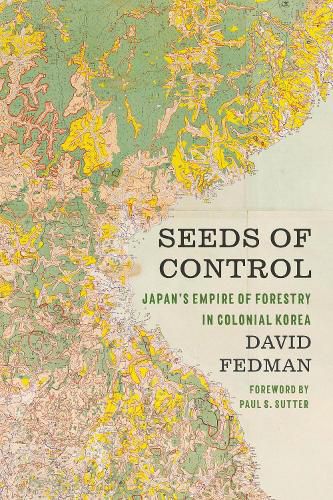Readings Newsletter
Become a Readings Member to make your shopping experience even easier.
Sign in or sign up for free!
You’re not far away from qualifying for FREE standard shipping within Australia
You’ve qualified for FREE standard shipping within Australia
The cart is loading…






Conservation as a tool of colonialism in early twentieth-century Korea
Japanese colonial rule in Korea (1905-1945) ushered in natural resource management programs that profoundly altered access to and ownership of the peninsula's extensive mountains and forests. Under the banner of "forest love," the colonial government set out to restructure the rhythms and routines of agrarian life, targeting everything from home heating to food preparation. Timber industrialists, meanwhile, channeled Korea's forest resources into supply chains that grew in tandem with Japan's imperial sphere. These mechanisms of resource control were only fortified after 1937, when the peninsula and its forests were mobilized for total war.
In this wide-ranging study David Fedman explores Japanese imperialism through the lens of forest conservation in colonial Korea-a project of environmental rule that outlived the empire itself. Holding up for scrutiny the notion of conservation, Seeds of Control examines the roots of Japanese ideas about the Korean landscape, as well as the consequences and aftermath of Japanese approaches to Korea's "greenification." Drawing from sources in Japanese and Korean, Fedman writes colonized lands into Japanese environmental history, revealing a largely untold story of green imperialism in Asia.
$9.00 standard shipping within Australia
FREE standard shipping within Australia for orders over $100.00
Express & International shipping calculated at checkout
Conservation as a tool of colonialism in early twentieth-century Korea
Japanese colonial rule in Korea (1905-1945) ushered in natural resource management programs that profoundly altered access to and ownership of the peninsula's extensive mountains and forests. Under the banner of "forest love," the colonial government set out to restructure the rhythms and routines of agrarian life, targeting everything from home heating to food preparation. Timber industrialists, meanwhile, channeled Korea's forest resources into supply chains that grew in tandem with Japan's imperial sphere. These mechanisms of resource control were only fortified after 1937, when the peninsula and its forests were mobilized for total war.
In this wide-ranging study David Fedman explores Japanese imperialism through the lens of forest conservation in colonial Korea-a project of environmental rule that outlived the empire itself. Holding up for scrutiny the notion of conservation, Seeds of Control examines the roots of Japanese ideas about the Korean landscape, as well as the consequences and aftermath of Japanese approaches to Korea's "greenification." Drawing from sources in Japanese and Korean, Fedman writes colonized lands into Japanese environmental history, revealing a largely untold story of green imperialism in Asia.